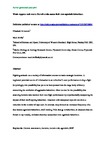Weak rappers rock more: Hermit crabs assess their own agonistic behaviour.
| dc.contributor.author | Edmonds, E | |
| dc.contributor.author | Briffa, Mark | |
| dc.date.accessioned | 2016-01-22T10:04:27Z | |
| dc.date.available | 2016-01-22T10:04:27Z | |
| dc.date.issued | 2016-01-06 | |
| dc.identifier.issn | 1744-9561 | |
| dc.identifier.issn | 1744-957X | |
| dc.identifier.other | rsbl.2015.0884 | |
| dc.identifier.uri | http://hdl.handle.net/10026.1/4219 | |
| dc.description.abstract |
Fighting animals use a variety of information sources to make strategic decisions. A neglected potential source of information is an individual’s own performance during a fight. Surprisingly, this possibility has yet to be incorporated into the large body of theory concerning the evolution of aggressive behaviour. Here we test for the possibility that attacking hermit crabs monitor their own fight performance by experimentally dampening the impact of their shell rapping behaviour. Attackers with dampened raps did not show a reduction in the number of raps used. In contrast, they showed an increased frequency of a less intense agonistic behaviour, shell rocking. This change in behaviour, in attackers that are forced to rap weakly, indicates that they assess their own agonistic behaviour. | |
| dc.format.extent | 20150884-20150884 | |
| dc.format.medium | ||
| dc.language | en | |
| dc.language.iso | en | |
| dc.publisher | The Royal Society | |
| dc.subject | Contest | |
| dc.subject | Assessment | |
| dc.subject | Decision | |
| dc.subject | Hermit crab | |
| dc.subject | Agonistic | |
| dc.subject | RHP | |
| dc.title | Weak rappers rock more: Hermit crabs assess their own agonistic behaviour. | |
| dc.type | journal-article | |
| dc.type | Article | |
| plymouth.author-url | https://www.webofscience.com/api/gateway?GWVersion=2&SrcApp=PARTNER_APP&SrcAuth=LinksAMR&KeyUT=WOS:000368940900018&DestLinkType=FullRecord&DestApp=ALL_WOS&UsrCustomerID=11bb513d99f797142bcfeffcc58ea008 | |
| plymouth.issue | 1 | |
| plymouth.volume | 12 | |
| plymouth.publication-status | Published | |
| plymouth.journal | Biology Letters | |
| dc.identifier.doi | 10.1098/rsbl.2015.0884 | |
| plymouth.organisational-group | /Plymouth | |
| plymouth.organisational-group | /Plymouth/Faculty of Science and Engineering | |
| plymouth.organisational-group | /Plymouth/Faculty of Science and Engineering/School of Biological and Marine Sciences | |
| plymouth.organisational-group | /Plymouth/REF 2021 Researchers by UoA | |
| plymouth.organisational-group | /Plymouth/REF 2021 Researchers by UoA/UoA04 Psychology, Psychiatry and Neuroscience | |
| plymouth.organisational-group | /Plymouth/Research Groups | |
| plymouth.organisational-group | /Plymouth/Research Groups/Marine Institute | |
| plymouth.organisational-group | /Plymouth/Users by role | |
| plymouth.organisational-group | /Plymouth/Users by role/Academics | |
| plymouth.organisational-group | /Plymouth/Users by role/Researchers in ResearchFish submission | |
| dc.publisher.place | England | |
| dcterms.dateAccepted | 2015-12-03 | |
| dc.rights.embargodate | 2017-01-06 | |
| dc.identifier.eissn | 1744-957X | |
| dc.rights.embargoperiod | 12 months | |
| rioxxterms.versionofrecord | 10.1098/rsbl.2015.0884 | |
| rioxxterms.licenseref.uri | http://www.rioxx.net/licenses/under-embargo-all-rights-reserved | |
| rioxxterms.licenseref.startdate | 2016-01-06 | |
| rioxxterms.type | Journal Article/Review |


